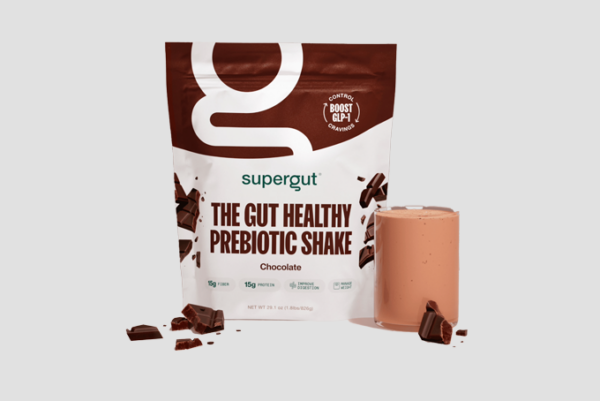So, you want to get your health on track. And you’re hearing about probiotics all over social media and from your friends and family. Specifically, about how it helps with your gut health.
Our beginners guide to probiotics will provide a clear picture to help you utilize probiotics on your healing journey. By the end of this simple guide, you’ll know what probiotics are, why they’re important for your gut health, what prebiotics are, when you should use probiotics, and how your bio-individuality comes into play.
Also, we’ll give you some recommendations for trustworthy probiotic brands.
Let’s get started!
What Are Probiotics?
Probiotics are good bacteria that live in your gut and help keep your body balanced and healthy. Think of your gut like a garden. Probiotics are the helpful plants that keep the soil (your digestive system) thriving. At the same time, it crowds out the weeds (bad bacteria).
They may support digestion, boost your immune system, and help your body stay happy and harmonious. You can find probiotics in foods like yogurt, kefir, sauerkraut, and kimchi. Also, you can take them as supplements to help keep your gut strong and balanced. Or you can do both.
Why is Gut Health Important?
Gut health plays a pivotal role in your digestion, immunity, and overall well-being. A balanced gut microbiome consists of a community of trillions of bacteria living in your digestive tract. Which is why probiotics are essential. They help your body break down food, absorb nutrients, and keep harmful microbes in check.
When your gut is healthy, it supports everything from sustained energy levels to a strong immune system. About 70%-80% of your immune cells reside in the gut, making it a key player in defending against illness.
So, what if you have poor gut health? Besides digestive issues, it could lead to skin problems, mood disorders, and even chronic inflammation. The gut-brain connection is strong. Your microbiome can influence stress, anxiety, and sleep. An imbalance in gut bacteria is also linked to conditions like type 2 diabetes, obesity, and autoimmune diseases.
Benefits of a healthy gut:
- Helps with digestion and nutrient absorption
- Strengthens immune system
- Improves mood and mental clarity
- Supports healthy weight management
- Reduces inflammation and chronic disease risk
- Helps with better energy levels
- Clears skin
What Do Prebiotics Do?
Prebiotics are food for the good bacteria living in your gut. They come mainly from specific carbohydrates (mostly non-digestible fiber). They pass through to the colon where they are fermented by bacteria in your gut. And this fermentation process helps healthy bacteria grow and thrive. Dietary sources of prebiotics include:
- Onions
- Leeks
- Asparagus
- Bananas
- Barley
- Oats
- Garlic
By including prebiotics in your diet, you can help maintain a balanced gut microbiome. Essentially, prebiotics help the helpers (good bacteria) to maintain your overall wellbeing. Prebiotics have also been linked to improved calcium absorption, enhanced immune defense, and a lower risk of certain chronic diseases.
When Should You Use Probiotics?
The Standard American Diet (SAD) does quite the number on your gut. How does it affect you? It consists of highly processed foods, added sugar, and refined carbohydrates that lack the proper balance of nutrients and minerals. SAD is a wrecking crew that may lead to many issues and diseases over time. Anyone who is exposed to SAD may benefit from using probiotics.
However, probiotics alone won’t get you to a healthier place. Eating healthier, exercising, and taking care of your mental health all play their respective roles in getting to a healthier you. But probiotics are a key player for many individuals.
Besides helping reverse the effects of SAD, probiotics may be beneficial after situations that disrupt your gut microbiome. For example, taking antibiotics, while necessary for fighting bacterial infection, wipe out all kinds of bacteria. That means you lose the good bacteria, too. This can lead to digestive issues like bloating, diarrhea, or constipation. And it can affect your overall mood.
People who have irritable bowel syndrome (IBS), inflammatory bowel disease (IDB), or other gastrointestinal conditions may benefit from the use of probiotics. Specific probiotic strains can support gut health and reduce inflammation.
Also, probiotics come in handy when your immune system needs an extra boost. You can use them during the cold and flu season or times of high stress like when you’re in the thick of a big project at work.
And probiotics may be used if you are looking to improve your gut health overall, as it helps strengthen the gut-brain axis. Probiotics may help improve your immune function, reduce risk of respiratory infections, and support your mental health.
Remember to consult with your healthcare provider for personalized guidance in using probiotics.
Bio-individuality and Probiotics
Each person has unique biological needs based on a few factors like genetics, gut health, and lifestyle. That’s the concept of bio-individuality.
There is no one-size-fits-all answer for probiotics. Or mental health. Or exercise. And the list goes on. That is why a personalized approach to wellness is a must. Bio-individuality encourages a deeper understanding of one’s own body, promoting self-awareness and empowering people to make choices that align with their specific health goals and conditions.
Probiotics play a vital role in supporting gut health, often at the heart of overall well-being. These beneficial bacteria help balance the gut microbiome, aid digestion, improve immune function, and support mental health. However, not everyone responds to the same strains or dosages of probiotics in quite the same way. Some people may need to experiment a bit to see which strains work best for their situation and body. Understanding and honoring this uniqueness can lead to more effective use of probiotics as part of a holistic health plan.
How to Find Quality Probiotics
Finding quality probiotics can feel a little overwhelming. Here are a few key questions to help you find the best for your health journey:
Does it have specific strains?
Look for probiotics with exact strains. For example: Bifidobacterium lactis as opposed to general categories like Bifidobacterium. Quality brands get granular about what’s in their product.
Is there a CFU count?
CFU (colony-forming units) tells you the number of live microorganisms in each serving. The right amount truly depends on your personal health needs. However, a good range is between 5 billion and 50 billion CFUs.
Does the probiotic brand use third-party testing?
Third-party certifications verify the product’s purity and potency. You know you’re getting live probiotics that are accurately labeled.
Has it been tested for contaminants or additives?
You want to avoid probiotics with chemicals, heavy metals, aflatoxins, artificial colors, bulking agents, etc.
Does the probiotic brand provide scientific evidence for effectiveness?
A brand should provide scientific evidence regarding its efficacy.
Remember, not all probiotics are made equally. You need to choose the one that’s right for your health journey. So, teaming up with your healthcare provider to come up with a customized game plan is ideal.
Gut Health Support
Bio-individuality plays an essential role when choosing a probiotics brand or any supplements for gut health support. Your unique biological makeup and what you want to accomplish on your health journey should be considered when choosing the appropriate supplement brands and products. Therefore, we highly encourage you to team up with your healthcare provider to choose supplements to use. The following products and services for your gut health is a good place to start.
Here are two quality gut health products to consider:

Eden’s 3-in-1 Synbiotic Superblend
Eden’s 3-in-1 Synbiotic Superblend is at daily gut health essential. It’s clinically formulated with Solnul®, Sunfiber®, Sweoat®, and Barley Balance® to nourish your microbiome and support digestion, blood sugar balance, and immunity. This powerful prebiotic and probiotic fiber blend promotes regularity, curbs cravings, and fuels sustained energy. And it doesn’t have any artificial additives. Whether you’re looking to improve digestion or support overall metabolic health, Eden’s Gut Food delivers clean, science-backed support.
Supergut The Gut Health Prebiotic Shake
Supergut Shakes are powered by a proprietary resistant starch fiber blend that supports gut health and metabolism without spiking blood sugar. Each shake delivers 20g of fiber, 15g of high-quality protein, and essential vitamins and minerals, making it a satisfying on-the-go option. With no added sugar, low net carbs, and options for both dairy and vegan diets, Supergut fits seamlessly into any lifestyle while nourishing your gut and rebooting your metabolism.
Here are two great options for testing your gut health:
BrilliantBiome Discovery Kit
Get to know your gut with a science-backed gut health test that delivers personalized insights to improve your microbiome and digestion. This easy-to-use kit uses advanced AI and machine learning to analyze your sample, providing a detailed report with actionable recommendations. Just sign up, send in your sample, and receive expert guidance tailored to your unique gut profile, empowering you to take control of your digestive health with real data and real solutions.
Biohm Technologies Microbiome Gut Health Test Kits
Get a deep understanding of your gut health with Biohm Technologies at-home gut microbiome test. It’s simple, convenient, and scientifically advanced. Just collect your stool sample using the easy kit with a pre-paid return envelope. Their Tier One lab uses next-generation 16S and ITS sequencing to analyze thousands of bacterial and fungal species. In 2–4 weeks, you’ll receive a detailed report with your personalized Gut Score®, measuring microbiome diversity, balance, and health, helping you take control of your digestive wellness.
Common Side Effects of Probiotics
For most people, probiotics are generally safe. However, like with anything new introduced to your body, there’s an adjusting period. At first, taking probiotics may come with temporary, mild side effects. This may include bloating, gas, or mild stomach cramps. These symptoms are usually a sign your gut is adjusting to the probiotics. And they typically go away in about a week.
If you’re dealing with Small Intestines Bacterial Overgrowth (SIBO) or are immunocompromised (you have an impaired immune system), probiotics may not be right for you at the moment. Discuss the use of probiotics with your healthcare provider to come up with a customized plan for your health journey.


